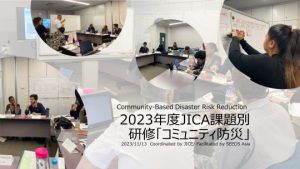Lecturing at JICA Knowledge Co-Creation Program [Philippines]
The JICA Knowledge Co-Creation Program themed Community-based Disaster Risk Reduction for the financial year 2023 was conducted, coordinated by Japan International Cooperation Center (JICE). This training focuses on community-based disaster risk reduction (DRR) and aims at deepening respective trainees’ perspectives and knowledge through practical examples and lectures by visiting various locations and diverse lecturers all over Japan. SEEDS Asia took charge in the unit “Community-based DRR in Other Countries” which Executive Director Mitsuko Otsuyama spearheaded on November 13.

Participants were government officials working with resident- and community-led organizations and community-based DRR activities from nine countries (Almenia, Tajikistan, Trinidad and Tobago, Tonga, Niue, Brazil, Belize, Botswana, Micronesia, the Maldives among which one country was absent). Mitsuko Otsuyama’s lecture consisted of a workshop in which the participants were able to learn about specific challenges and practical examples in the implementation of community-based DRR.
There was rich diversity in the participants in terms of ethnicities, regions, and religions. In consideration of an actual scenario where a group of enormous diversity establish common understanding and solutions, a case study was presented along with SEEDS Asia’s eight practice tools. The question “What would you do if you were a village DRR committee member?” which facilitated the discussion, analysis, and planning.
There is so much difference in community-based DRR in Japan and in the participants’ countries of origin. First, the definition of community varies: physical distances involving ‘neighborhood’ differ, and the word “community” reminds many of “communal” as in ethnic, religious, and class groups. Therefore, a detailed explanation on the difference between the word community in DRR fields and communal was highlighted, emphasizing that practice requires to be holistic and inclusive of any members in the “community.”
Second, the concept of self-help, mutual help, and public help does not work out in many countries as steadily as in Japan. This concept does not apply in areas where their public services are not functioning due to political or economic instability. This results in more of self- and mutual help required to perform DRR and replacement of public help with N-help, N signifying networks with UN, NGO, and academic institutions. This big difference was identified in the participants’ stakeholder analysis.
It is hoped that knowing about examples in Japan at the same time with learning about various examples elsewhere helped the participants enhance, expand, and widely prevail their practice in community-DRR. It was a pleasure to meet people from areas that we have never been to and to learn from them. Thank you for this great opportunity, to the participants and to JICE.